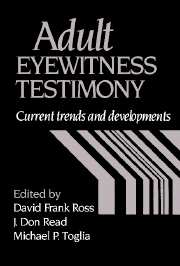Book contents
- Frontmatter
- Contents
- List of contributors
- Preface
- Part I Cognitive, physical and social processes and factors influencing eyewitness recall and identification
- Part II Lineup construction and collection of testimony
- Part III Whom to believe? Distinguishing accurate from inaccurate eyewitnesses
- Name index
- Subject index
Preface
Published online by Cambridge University Press: 04 August 2010
- Frontmatter
- Contents
- List of contributors
- Preface
- Part I Cognitive, physical and social processes and factors influencing eyewitness recall and identification
- Part II Lineup construction and collection of testimony
- Part III Whom to believe? Distinguishing accurate from inaccurate eyewitnesses
- Name index
- Subject index
Summary
The impetus for this book was a symposium that was presented at the American Psychological Society meeting in Washington, D.C. in June of 1991. Following the symposium there was a general agreement among the six symposium contributors of the need for an edited volume directed at surveying the wide range of topics on eyewitness testimony that were being investigated. As many observers have noted, the field of psychology and the law has seen enormous growth within the last decade and within this broad field the topic of eyewitness testimony has received a great deal of attention. Because there had not been a volume dedicated to adult eyewitness testimony since the 1984 classic, Eyewitness Testimony: Psychological Perspectives, edited by Gary Wells and Elizabeth Loftus and published by Cambridge University Press, we embarked on this project to fill a void in the literature. We chose topics that are representative of the diversity of research currently being conducted in the field.
In the history of the legal system, there are numerous examples of individuals who have been accused, tried, and convicted of crimes they did not commit. These unfortunate events can follow the misidentification of an innocent person from a police lineup by an eyewitness when the court has accepted and weighted the identification evidence heavily in its decision. The present volume is designed to provide an overview of current empirical research on adult eyewitness testimony and identification accuracy, providing insight into theory and application. The volume contains eighteen chapters written by psycholegal researchers from the United States, Canada, Scotland, and Germany.
- Type
- Chapter
- Information
- Adult Eyewitness TestimonyCurrent Trends and Developments, pp. ix - xivPublisher: Cambridge University PressPrint publication year: 1994
- 1
- Cited by

